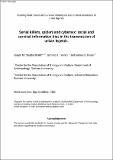Serial killers, spiders and cybersex : social and survival information bias in the transmission of urban legends
Abstract
This study uses urban legends to examine the effects of the social information bias and survival information bias on cultural transmission across three phases of transmission: the choose-to-receive phase, the encode-and-retrieve phase, and the choose-to-transmit phase. In line with previous research into content biases, a linear transmission chain design with 60 participants aged 18-52 was used to examine the encode-and-retrieve phase, while participants were asked to rank their interest in reading the story behind a headline and passing a story on for the other two phases. Legends which contained social information (Social Type), legends which contained survival information (Survival Type), and legends which contained both forms of information (Combined Type) were all recalled with significantly greater accuracy than control material, while Social and Combined Type legends were recalled with significantly greater accuracy than Survival Type legends. In another study with 30 participants aged 18-22, no significant differences were found between legend types in either the choose-to-receive phase or the choose-to-transmit phase.
Citation
Stubbersfield , J M , Tehrani , J J & Flynn , E G 2015 , ' Serial killers, spiders and cybersex : social and survival information bias in the transmission of urban legends ' , British Journal of Psychology , vol. 106 , no. 2 , pp. 288-307 . https://doi.org/10.1111/bjop.12073
Publication
British Journal of Psychology
Status
Peer reviewed
ISSN
0007-1269Type
Journal article
Description
Date of Acceptance: 02/05/2014Collections
Items in the St Andrews Research Repository are protected by copyright, with all rights reserved, unless otherwise indicated.

